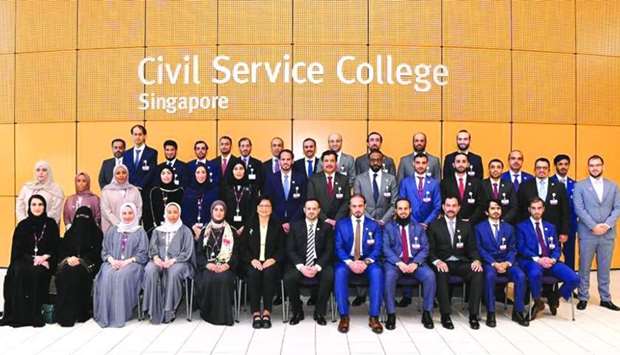Qatar Leadership Centre’s (QLC) Government Leaders Programme participants have returned to Doha after completing the 2019 Learning Journey to Singapore.
The leading experts in a range of institutions shared insights on the policy and practice behind the successful national model, with a focus on industrial innovation, economic development, and education and health policy.
HE Sheikh Dr Abdulla bin Ali al-Thani, managing director and member of the Board of Directors of QLC, noted that “Singapore’s model of self-sufficiency is directly relevant for QLC participants” who can apply its lessons in their work with Qatari companies and government institutions.
He highlighted the significance of Learning Journeys as “an integral part of the National Leadership Programme, with a critical role in strengthening participants’ capabilities by providing valuable, first-hand learning experiences.”
QLC’s partner for the Learning Journey, the Civil Service College Singapore, is the centre of learning for government employees; it is part of the Public Service Division, located within the Prime Minister's Office. During their study trip to Singapore, the QLC delegation visited leading academic and research institutions and government entities to explore the pivotal role of government leadership in driving a strong economy.
In Singapore, QLC participants met with Tina Tan, director of Civil Service College International, who discussed the Fourth Industrial Revolution and challenges posed by emerging technologies, such as artificial intelligence and virtual reality, in public service delivery. She highlighted the role of leadership in ensuring institutional goals are met while adapting to major economic and societal change at the same time.
Dr Toh Boon Kwan, senior research fellow at the Institute for Governance and Policy, analysed the role of leaders in shaping governance and policy-making and shared advice on building collaborative partnerships. He also outlined Singapore's strategy on economic development and its approach to strengthening its manufacturing sector, critical factors in its national development.
During their visit to the Institute of Technical Education in Singapore, participants learned how national educational policies can build social cohesion and national identity while also supporting economic development. In addition, they were introduced to other educational tools that can help a nation achieve its economic aspirations, as well as ways to develop the workforce to support the industrial sector.
The Institute briefed participants on their holistic strategy to combat potential external threats, based on six pillars – military, social, civil, economic, psychological, and digital. Speakers emphasized the importance of self-sufficiency gained through long-term planning, highlighting food security and how Singapore both diversified sources of food imports and bolstered local food production.
HE Sheikh Dr Abdulla bin Ali al-Thani, managing director and member of the Board of Directors of QLC, noted that “Singapore’s model of self-sufficiency is directly relevant for QLC participants” who can apply its lessons in their work with Qatari companies and government institutions.
He highlighted the significance of Learning Journeys as “an integral part of the National Leadership Programme, with a critical role in strengthening participants’ capabilities by providing valuable, first-hand learning experiences.”
QLC’s partner for the Learning Journey, the Civil Service College Singapore, is the centre of learning for government employees; it is part of the Public Service Division, located within the Prime Minister's Office. During their study trip to Singapore, the QLC delegation visited leading academic and research institutions and government entities to explore the pivotal role of government leadership in driving a strong economy.
In Singapore, QLC participants met with Tina Tan, director of Civil Service College International, who discussed the Fourth Industrial Revolution and challenges posed by emerging technologies, such as artificial intelligence and virtual reality, in public service delivery. She highlighted the role of leadership in ensuring institutional goals are met while adapting to major economic and societal change at the same time.
Dr Toh Boon Kwan, senior research fellow at the Institute for Governance and Policy, analysed the role of leaders in shaping governance and policy-making and shared advice on building collaborative partnerships. He also outlined Singapore's strategy on economic development and its approach to strengthening its manufacturing sector, critical factors in its national development.
During their visit to the Institute of Technical Education in Singapore, participants learned how national educational policies can build social cohesion and national identity while also supporting economic development. In addition, they were introduced to other educational tools that can help a nation achieve its economic aspirations, as well as ways to develop the workforce to support the industrial sector.
The Institute briefed participants on their holistic strategy to combat potential external threats, based on six pillars – military, social, civil, economic, psychological, and digital. Speakers emphasized the importance of self-sufficiency gained through long-term planning, highlighting food security and how Singapore both diversified sources of food imports and bolstered local food production.

